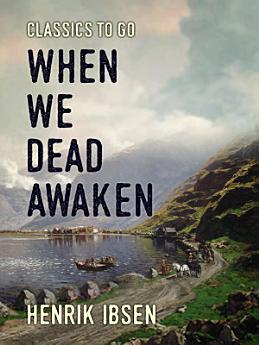When We Dead Awaken
Okt 2018 · Otbebookpublishing
E-book
55
Mga Page
family_home
Kwalipikado
info
reportHindi na-verify ang mga rating at review Matuto Pa
Tungkol sa ebook na ito
When We Dead Awaken is the last play written by Norwegian dramatist Henrik Ibsen. The first act takes place outside a spa overlooking a fjord. Sculptor Arnold Rubek and his wife Maia have just enjoyed breakfast and are reading newspapers and drinking champagne. They marvel at how quiet the spa is. Their conversation is lighthearted, but Arnold hints at a general unhappiness with his life. Maia also hints at disappointment. Arnold had promised to take her to a mountaintop to see the whole world as it is, but they have never done so... (Excerpt from Wikipedia)
Tungkol sa may-akda
Henrik Ibsen (1828-1906) was a pioneering Norwegian playwright and poet, often hailed as the "father of modern drama." Born in the small coastal town of Skien, Ibsen's early life was marked by financial hardship, which profoundly influenced his later works. He began his career in theater as a stage manager and playwright in Bergen and Oslo, where he honed his craft and developed a keen eye for the intricacies of human behavior and societal norms.Ibsen's literary contributions are monumental, as he broke away from the romantic tradition and introduced realism into the theater. His plays often scrutinized the moral fabric of society, challenging the status quo and exposing the hypocrisies of the bourgeoisie. This bold approach led to numerous controversies, as his works were frequently censored and criticized for their unflinching portrayal of taboo subjects such as marriage, gender roles, and individual freedom.One of Ibsen's most revolutionary ideas was his portrayal of strong, complex female characters who defied societal expectations, a theme that resonated deeply with the burgeoning feminist movement of the late 19th and early 20th centuries. His influence on contemporary writers is profound, inspiring figures such as George Bernard Shaw and Arthur Miller, who admired his unyielding commitment to truth and social critique.Ibsen spent much of his later life in self-imposed exile in Italy and Germany, where he continued to write prolifically. His legacy endures as a cornerstone of modern drama, and his works remain a staple in theaters worldwide, continually provoking thought and discussion about the human condition and societal structures.
I-rate ang e-book na ito
Ipalaam sa amin ang iyong opinyon.
Impormasyon sa pagbabasa
Mga smartphone at tablet
I-install ang Google Play Books app para sa Android at iPad/iPhone. Awtomatiko itong nagsi-sync sa account mo at nagbibigay-daan sa iyong magbasa online o offline nasaan ka man.
Mga laptop at computer
Maaari kang makinig sa mga audiobook na binili sa Google Play gamit ang web browser ng iyong computer.
Mga eReader at iba pang mga device
Para magbasa tungkol sa mga e-ink device gaya ng mga Kobo eReader, kakailanganin mong mag-download ng file at ilipat ito sa iyong device. Sundin ang mga detalyadong tagubilin sa Help Center para mailipat ang mga file sa mga sinusuportahang eReader.








